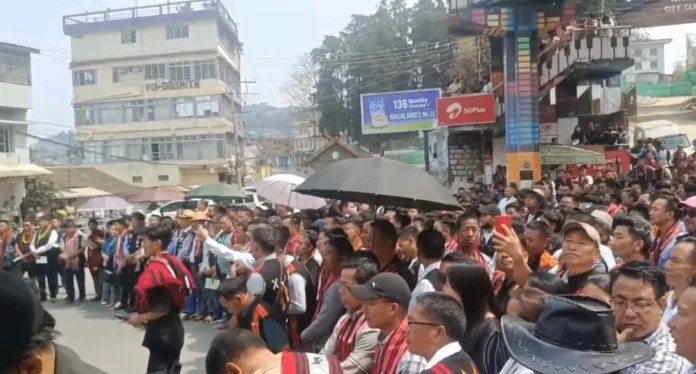KOHIMA, April 9: In a strong show of unity and resistance, tribal organisations in Nagaland held a massive public rally at the Old MLA Hostel Junction in Kohima on Wednesday, demanding that the Government of India immediately halt the proposed border fencing along the Indo-Myanmar border, restore the Free Movement Regime (FMR) in its original form, and withdraw the Protected Area Permit (PAP) from the state.
Organised by the Angami Public Organisation (APO) along with other tribal bodies based in Kohima, the rally culminated with the submission of a joint representation to Union Home Minister Amit Shah through Nagaland Governor La Ganesan at the Raj Bhavan.
The representation expressed deep concern over a series of recent decisions by the Ministry of Home Affairs that, according to the tribal units, threaten the cultural, historical, and social rights of the indigenous Naga communities residing along the India-Myanmar border.
Referring to the February 6, 2024 announcement by Home Minister Amit Shah to scrap the Free Movement Regime and initiate border fencing, the representation stated that the move “stunned our people, as it would amount to uprooting them from their ancestral land.” It noted that while the government claimed not to have fully scrapped the FMR, revised guidelines issued on December 24, 2024, introduced a new ‘border pass’ system restricting free cross-border movement to just 10 km and limiting entry/exit to only nine points along Nagaland’s 215 km international boundary with Myanmar.
Further compounding their concerns, the representation highlighted the December 17, 2024 order that withdrew Nagaland’s exemption from the Protected Area regime, thereby requiring foreigners to obtain a PAP or Restricted Area Permit (RAP) to enter the state. Tribal leaders decried the timing and intent of these two back-to-back orders, describing them as a “lethal combination” designed to target the Naga people for no fault of theirs.
“It is no coincidence that the 17 December 2024 order and the 24 December 2024 guidelines were issued back-to-back,” the tribal bodies stated. “In the name of introducing a new system to regulate cross-border movement of people, the government has once again violated the historical and cultural rights of the indigenous Naga people.”
The representation pointed out that prior to the formation of modern India, the Nagas had already established their ancestral homeland in the Naga Hills, which today span the India-Myanmar border. The arbitrary colonial borders inherited by independent India were never accepted by the Naga communities, who continue to view the region as a single, shared cultural and economic space. The Free Movement Regime, initially an informal agreement that allowed Nagas to travel freely across a 40 km radius, was already reduced to 16 km in 2018 and has now been further curtailed.
“Today, forcing our people to obtain a ‘border pass’ to move within their own land is unacceptable—it is tantamount to taking permission to move around in one’s own house,” the tribal leaders stated. They noted that the residents of border districts were already suffering under the new system, and insisted that the entire policy framework be revoked.
On the issue of fencing the Indo-Myanmar border, the tribal units declared, “We are against the idea of dividing our ancestral land. Constructing fences along the border and dividing people and land is an outright violation of indigenous rights.” They argued that fencing would destroy centuries-old connections among Naga tribes living on both sides of the border, and appealed for the restoration of the FMR in its original form—not only as a recognition of indigenous rights but also to ensure peace and stability in the region.
The imposition of the Protected Area Permit (PAP), the representation warned, would further isolate Nagaland from international visitors and harm its growing tourism industry, especially during major cultural events. They stated that reading the PAP requirement alongside the new border pass system exposes a larger design by the central government to limit and control indigenous movement.
Citing India’s endorsement of the United Nations Declaration on the Rights of Indigenous Peoples (UNDRIP), the tribal leaders urged the Government of India to align its border policies with Article 36 of the declaration, which upholds the rights of indigenous peoples divided by international borders to maintain and develop contacts, relations, and cooperation with their own people.
Concluding their appeal, the tribal organisations stressed that their protest should not be mistaken for weakness. “As we earnestly plea for our rights, we would also like to firmly state that we will not allow our rights to be compromised at any cost. Our democratic appeal and civilised protest to safeguard our rights should not be seen as a weakness.”
The representation was signed by leaders from 19 tribal bodies in Kohima, including Thejao Vihienuo (APO), O Onglingaku (Chang Union Kohima), Dozhohu Tunyi (Chakhesang Hoho Kohima), Thanghoi Lam (Khiamniungan Union Kohima), T Chubayanger (Kohima Ao Union), KN Mhonthung Lotha (Kohima Lotha Hoho), K Shiwoto Wotsa (Kohima Sumi Hoho), Khongjeh Konyak (Konyak Union Kohima), Dihe Mao (Mao Union Kohima), Kangdi Maram (Maram Union Kohima), Neiba Newmai (Nagaland Zeliang People’s Organisation Kohima), Imti Phom (Phom Union Kohima), Wachusie Katiry (Pochury Union Kohima), DB Kaisii (Poumai Naga Union Kohima), K Gwanilo Himb (Rengma Public Organisation), Thsapongse Sangtam (Sangtam Union Kohima), James Luiram (Tangkhul Union Kohima), Tsiithong (Tikhir Union Kohima), and Akum Yimkhiung (Yimkhiung Union Kohima).

